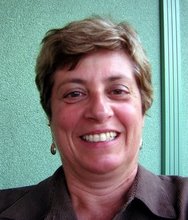On the second Sunday of each month, a group of six to fifteen women from the Detroit area meet to pray, sing, dance, reflect on the Sunday scriptures, and to break bread together.
Many of the women come for strength. Some come for sustenance. Others are there because they don't fit in the Church. The one thing they all have in common, however, is that they see their gatherings as an expression of the friendship and equal partnership they feel with Jesus and each other.
Their gatherings aren't secret nor are they officially sanctioned, but they do give the women the opportunity to experience the hidden, feminine side of Church, which they find spiritually enriching and can't get in the patriarchal Church.
The group calls itself Women's Eucharist or WE for short, and it is part of a nationwide movement that has grown over the past couple decades without much promotion or fanfare. In fact, according to Sheila Durkin Dierks, who studied 100 WE groups across America for her book Women's Eucharist, many of the women start a group without knowledge of other groups.
Sister Beth Rindler, 73, one of the founders of a WE begun in Detroit in 1990, started the group because she was restricted by Church law from celebrating the sacraments simply because she is a woman. As a pastoral associate with a Master of Divinity (M. Div.) degree from Catholic Theological Union (CTU) in Chicago, she found that her ministry still was not welcomed by parish priests.
"Priests really wanted women to be servants to them and not partners," she says. "As a religious I thought of myself as a partner to live and share the Gospel in a demonstrable and public way."
Another member of WE, Peggy Bennett, had no aspirations to the priesthood. Instead, she was looking for a practical, everyday spirituality and was "re-exploring [her] Catholic heritage after being away for a long, long time."
Bennett had been studying in a two-year Jesuit spirituality program at Manresa in Bloomfield Hills, Michigan, before she joined WE. As she looked for the "Spirit" she says she couldn't find it in the Catholic Church--or any other organized religion. Eventually, she found that Manresa, too, lacked the kind of spirituality she was looking for because, like the Church, it was "too intellectual." Nevertheless, her advisor suggested that she start a women's spirituality group and that led to her finding Sister Beth.
The Detroit WE originally met on the 18th floor of a downtown apartment building that overlooked the Detroit River, consequently, the members called themselves "the Upper Room." However, when one of the members moved out of her apartment and the group needed a new gathering place, Bennett volunteered to hold the meetings at her house in Ann Arbor. Now the group calls itself "The Cathedral" because of the high ceilings in Bennett's house.
For Bennett, WE exemplifies a democratic form of spirituality: she offers her home and plans the music and dance for the gatherings, but it is the members of the group that make WE a participative and life-giving experience through their sharing, reflections, prayers, and meal after the service.
The intimacy of the group's celebrations are a means toward joining the personal, political, and spiritual life, says Rosalie Riegle, 68, another member of WE, a professor and founder of a Catholic Worker House in Saginaw, Michigan. Women's Eucharist is a feminine extension of the home Masses she attended during the early post-Vatican II period.
"[With Women's Eucharist] everything flows together: the Eucharistic meal and our potluck, the friendship and the love we share and the love we have for God," says Riegle, who started a Women's Eucharist group in Saginaw, Michigan, before her recent move to Chicago.
Historical Context of Women's Eucharist
What led women to this celebration of the breaking of bread did not just happen. Rather, it was and continues to be an evolving outcome of a changing Church in the midst of the vast social and political changes.
(Note: You can view every article as one long page if you sign up as an Advocate Member, or higher).






